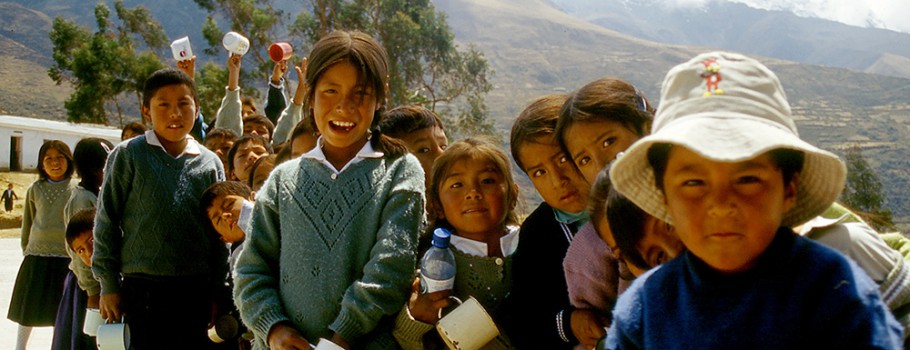
“So that people can live a dignified life in accordance with their social environment and nature, regardless of their social, cultural, ethnic origin, sex, creed or political opinion.”
This vision of Fundación Pueblo was laid down in its statutes at the creation of the Foundation. (Article 4).
Poverty and inequality in a rich country.
What may sound in the West like a relatively obvious commitment to equal opportunities, is in Bolivia connected with major challenges on a daily basis. Notwithstanding the many inhabitants of Bolivia encouraging economic growth in recent years, the country in the inside of the continent remains by far the poorest country in South America.
Bolivia is indeed rich in human, natural and cultural treasures, but next to Brazil it is the country with the biggest gap between the poor and the rich in South America. Whoever is born to an indigenous mother in the countryside has very few possibilities to obtain a solid basic education, and as an adult will struggle to have a decent livelihood. The son of the urban middle class, on the other hand, has much better odds. Through failure of education and poor access to information, the legal means of civic participation, which the plurinacional (the state consisting of several nationalities) offers, is hardly made use of.
Concrete help against discrimination in aid of equal opportunities
The Fundación Pueblo has set itself the task of not only thinking about poverty, lack of opportunities and discrimination, but also to make concrete improvement in the lives of others in our sphere of activity in Bolivia. This means: to bring more young people to school and to vocational training rather than to child labour; to strengthen the position of indigenous women in rural areas through new income opportunities; civic information for community development made available to grass-roots organisations in the country; and engaging with county councils by giving them meaningful development projects.
The contributions we can make to grapple with this task are limited yet diverse. They are based on the bridges of solidarity that we can build between people and groups in Bolivia and beyond. . . It is the experienced chef from La Paz who shares with the host mothers in Potosi her secrets for healthy and cheaper meals; it is the young political scientist from the university who convinces the district council of the importance of school access for all; it is the community in Bavaria and Lower Saxony who support the projects to improve living conditions in rural areas of Bolivia with their donations.
Principles of our work
“The road to the abyss is paved with good intentions”, so the much used saying goes in Bolivia. This means that good will alone is not enough to successfully implement an intention, understanding is also necessary. This also applies to many projects in wealthy countries such as Germany, but all the more to a richly challenging environment such as Bolivia, which is characterised by a diversity of cultures. Here so many well intentioned projects have not achieved their desired success.
The Fundación Pueblo tries learn what is accessible to the seeker through its wealth of experience in development work. From the mistakes and successes of working in an intercultural environment we have derived a few simple principles that we try to follow in our work. These include:
Application principle
No project without explicit demand from the target groups. We initiate projects only if we are asked to. We regard this as a minimum requirement to ensure the interest and participation of the target groups. In this way we avoid imposing our own ideas, as good as they be, on the project participants.
Participation principle
No project without a substantial contribution from the project beneficiaries. Only those who bring at least a small but noticeable contribution, are suitable for a project funded by us. We regard this as a minimum requirement in order to promote the sustainability of the projects. The form and level of the individual contribution depends on the real possibilities of the target group: A host mother makes her house available for a school child from the remote peasantry, a county council provides budget funds for the implementation of the project.
“Technical” preliminary
The Fundación Pueblo expects its employees to represent not only their good will, but also their knowledge in their service of a good cause. Not every project application of the target groups makes technical, social or economic sense. We try to examine these aspects in advance and discuss with stakeholders before we employ our resources.
Written project agreements
Whenever possible the agreements are put in writing to the project participants, so that the goals, contents and responsibilities are clearly laid down as the ‘rules’ of cooperation. This contributes to the transparency of the projects and reduces the conflicts in the project implementation. Each host mother has in our school access program an agreement with us as does every child she looks after; the participating district has an agreement over the sharing of the project responsibilities and costs with Foundation Pueblo.
Accountability
The entirety of the foundation’s activities are filed and are publicly accountable in the yearly plenary meetings at the headquarters of the foundation. Friends of the foundation abroad receive a detailed annual report in German, which can be viewed on this website. Whoever has entrusted financial contributions for a project, whether target groups or partner organisations, is entitled to a detailed report on the proper use of its resources.
Learn together from experience
For most projects the foundation includes participatory evaluations with representatives of all parties at the end of the year as an integral part of the work load. We make every effort to track successes and problems of projects over longer time periods, such as in a listener poll of our country radio program. In each instance the review is intended to draw lessons from the past to improve the ongoing work of Fundación Pueblo.
Priorities: access to education and civics
Access to education and civics have become the focal points of Fundación Pueblo in recent years. In these areas, the Foundation has been able to develop skills that they can now put in the service of sustainable development nationwide in Bolivia and beyond.
Making civics useful – access to civic information
Access to civic information is crucial in order to strengthen the possibilities for the participation of the population in public decision-making processes in Bolivia and to ensure the sustainability of projects. Since 2003 with our program “Acceso Público” (Free Access) we have helped to drive a qualified debate about human rights and poverty reduction and to strengthen the democratic rights of disadvantaged groups in aBolivian civil society.
Providing access to basic education and creating jobs in the country
Through the project “Weekly Boarding in Indigenous Families” Fundación Pueblo found an innovative way to give the most disadvantaged children in rural area access to a full basic education. The program was distinguished by the United Nations. At the same time as helping children receive education, the project is linked to the development of small service providers at the local level, and can make an important contribution to the local economic development in the country. Here Indigenous women often receive for the first time the possibility of a socially prestigious activity as host mother with their own income, which stimulates purchasing power and demand for agricultural products in the municipality.
Children and women at the centre
In addition to the children, women benefit particularly from the countryside projects. This applies not only to the “Weekly Boarding in Indigenous Families” project but also to our vocational training program which was directed in recent years to girls and young women from rural areas. Our project to strengthen migrant women in El Alto accentuated women’s advancement in the field of civics as a Leitmotif of the Foundation’s work.
Where we improved our projects for school access and created new income opportunities for rural women we also continue to support local community development initiatives in adjoining areas, such as food security and improvement of housing.
The Foundation however is no longer pursuing the largely broad approach to community development – from roads to promotion of tourism – which had characterised the work of Fundación Pueblo in the first decade of its existence. After a self-critical look back at the experience of the early years, the focus of the charity work is now in on its native rural district – a thematic focal area, where we can use our good experience in the two areas of access to school and promoting democracy in service of the many rural communities of Bolivia.



